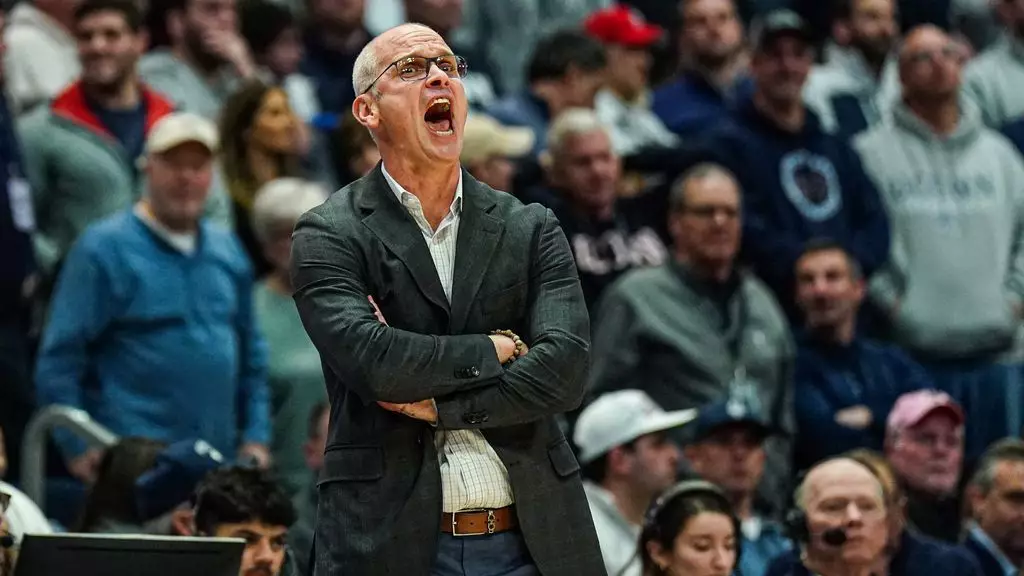In a game that would ultimately define their season, the UConn Huskies were eliminated from the NCAA tournament in a heart-wrenching 77-75 loss to the Florida Gators. For coach Dan Hurley, this wasn’t just a loss; it was a moment saturated with the weight of unfulfilled expectations. UConn was gunning for a third consecutive national title, a feat that would have solidified their place in college basketball history. However, as the game clock wound down, and defeat set in, Hurley’s emotions boiled over, leading to comments that would haunt him in the days to come.
Emotional fervor is an essential ingredient to coaching; it’s what can inspire young athletes to transcend their limitations. But when that fervor falters into impropriety, the consequences can reverberate far beyond a simple basketball game. Hurley’s remark about the officiating—“I hope they don’t f— you like they f—ed us”—was caught on camera, generating intense scrutiny and criticism. In the world of sports where leadership is revered, he found himself on the back foot, wrestling with the repercussions of a moment’s weakness.
In the Heat of the Moment
In his subsequent reflection, Hurley expressed regret over his outburst, admitting to reporters that there were “things that I wish I didn’t do.” This self-critique is commendable; however, it raises questions about the emotional maturity expected from leaders, particularly in high-stakes environments. Hurley characterized the officials as “three great refs” and specified that they earned Florida’s victory. It may seem admirable that he swiftly redirected the blame back to himself, but one cannot ignore how these moments of vulnerability reveal the educational gaps in the coaching staff’s training protocols.
While it’s human to falter under pressure, the accountability placed on coaches to maintain decorum is a concurrent theme in sports. The expectation for professional conduct looms large over any expecting mentor, and Hurley’s inability to manage his emotions during this critical juncture sheds light on an aspect of his coaching philosophy that potentially requires revisiting.
The Ripple Effect
The episode spiraled into a separate incident involving UConn’s communications director, Bobby Mullen, who asked a reporter to remove the damning footage. While Mullen has since apologized, this scenario highlights a concerning culture of defensiveness rather than accountability within the program. Instead of addressing the moment head-on, the focus shifted to the safeguarding of reputation—a troubling diversion for a program aiming for excellence at both athletic and ethical levels.
Hurley performed a delicate balancing act between fighter and family man; his camaraderie and protectiveness toward his team and staff are trotted out as a defense for contentious actions. Yet, one must wonder if this culture of loyalty borders on tribalism, where speaking out or taking responsibility becomes secondary to looking strong for the unit. The fights for loyalty and the right to blow off steam should not come at the complexity of character.
A Pattern of Behavior
This incident wasn’t an isolated event for Hurley; it reverberated throughout a season filled with fiery exchanges and displays of frustration—whether it was his outbursts at officials or exchanging barbs with fans after wins. During a year marked by such volatility, it is essential to question how the emotional landscape altered the experience for UConn players. Did those moments of raw passion create a culture of tension that overshadowed the game?
While fiery coaches can inject drama into the game, they also risk distractions that detract from performance. This convoluted dance between emotional expression and professional competence poses an ongoing conundrum in sports leadership—can great coaching exist hand-in-hand with a managed, emotional presence?
Looking Ahead
As Hurley expressed his desire to take measures “both internally, mentally, and externally,” one can only hope that it translates into constructive personal growth and improved leadership practices. A candid acknowledgement of his emotional weaknesses is a vital step, but it cannot end there. UConn is navigating a critical phase in its basketball history. The focus should remain not merely on winning games but also on cultivating a culture where accountability, reflection, and passion synergize to yield both personal and team growth.
Emotional intelligence is unwaveringly essential in guiding young athletes, and Hurley has the potential not only to reclaim the narrative of his season but to become a crucial player in reshaping what it means to lead in a high-pressure environment. The ramifications of this moment may be the catalyst for a deeper understanding, both for Hurley and for the program as it moves forward.

Leave a Reply